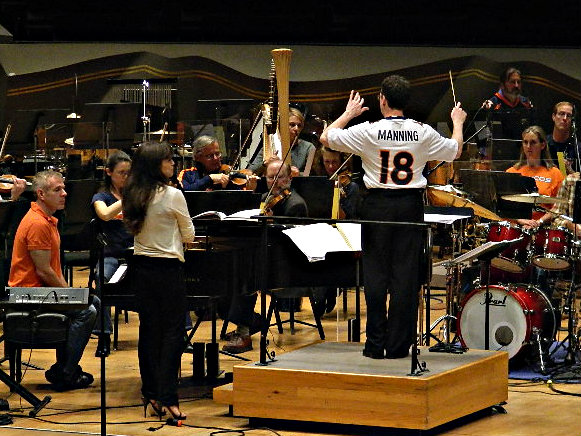
 The Colorado Symphony is re-outfitting itself for modern-day audiences—quite literally.
The Colorado Symphony is re-outfitting itself for modern-day audiences—quite literally.
On Tuesday, the organization announced it will drop the traditional tux and tails in favor of all black uniforms. It also plans to allow alcohol into Boettcher Concert Hall for its Masterworks concerts -- the orchestra’s most traditional classical music programs.
The question is: Why did it take so long?
The Colorado Symphony prides itself on being innovative. Its most recent trail-blazing moves include a series of “High Note” concerts sponsored by the cannabis industry and the upcoming “CSO Presents” programming that will bring nationally-recognized non-classical music acts to the Boettcher stage.
This first season includes seven concerts, ranging from a duo recital by jazz legends Herbie Hancock and Chick Corea to the Chieftains.
While other symphonies are exploring similar changes -- the Baltimore Symphony Orchestra is working with fashion students from Parsons School of Design in New York to design new outfits -- few have fully discarded tradition.
“Change is always something people have to wrap their head around,” Colorado Symphony senior vice president of innovative programming Anthony Pierce says.
The Colorado Symphony's artistic committee met this summer to discuss ways to make the Boettcher concert experience more accessible to contemporary audiences. Pierce says the team came to the conclusion that allowing alcohol and getting the musicians out of the traditional concert garb in favor of less formal black suits and dresses was a “no-brainer.”
“I know it’s tradition to a lot of people, but I don’t know why we retained it,” Pierce says, adding that the symphony has previously dressed its musicians in all-black for some pops programs and Red Rocks performances.
It has also previously allowed alcohol into many non-Masterworks performances. “That’s just part of what a modern consumer expects as part of their evening,” Pierce says.
As the City of Denver owns Boettcher Hall and city vendors handle concessions, the increased alcohol sales will not benefit the symphony itself.
The only changes the caterers will have to make is to provide plastic cups so that there will be no clinking of ice on glass in those whiskeys on the rocks -- one of the primary concerns orchestras typically raise about allowing alcohol in the concert hall.
While the black-garbed musicians in a wine-friendly venue signals an attitudinal change, the “CSO Presents” series is a major and potentially risky undertaking for the organization.
A number of symphony orchestras around the country, including the Los Angeles Philharmonic and the Nashville Symphony, have started similar series.
Pierce hopes that the “CSO Presents” fare will pull new audience members into future Masterworks concerts, with the beer and wine serving as additional enticements to Boettcher Concert Hall.
“There’s risk associated with this,” Pierce says of the orchestra’s latest strategic developments. “But as a nonprofit institution, we have to push barriers and find new revenue streams, and this is one way we’re doing that.”
These moves come at a challenging time in the Colorado Symphony’s history.
The orchestra is currently searching for a new home as Boettcher Concert Hall is scheduled to undergo repairs during the 2015-2016 season. The City of Denver is even toying with the idea of razing the building, the orchestra’s space for the past 36 years.
The orchestra is also expecting to show a financial loss for the past season. The extent of this loss will not be known until until the organization’s auditing process is complete at the end of September, Colorado Symphony director of community and media relations Laura Bond says.
Tune in to Colorado Matters host Ryan Warner’s interview with Colorado Symphony resident conductor Scott O’Neill next week to learn more about the organization’s fall programming and strategic developments.








